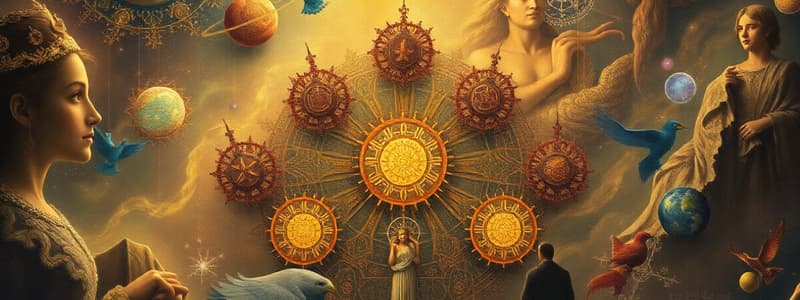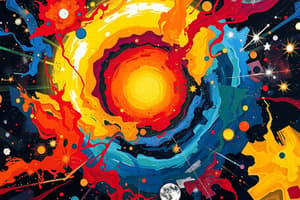Podcast
Questions and Answers
What is the age of the universe according to the provided information?
What is the age of the universe according to the provided information?
- 10.5 billion years
- 4.5 billion years
- 5 billion years
- 13.8 billion years (correct)
Which belief system holds that the universe has no beginning or end?
Which belief system holds that the universe has no beginning or end?
- Christianity
- Buddhism (correct)
- Judaism
- Islam
According to Mormon beliefs, what distinguishes their concept of creation?
According to Mormon beliefs, what distinguishes their concept of creation?
- Creation is from nothing ex nihilo.
- Creation occurs from pre-existing matter. (correct)
- The universe was created by a singular event.
- Everything is created by cyclical events.
Which of the following describes the Hindu view of creation?
Which of the following describes the Hindu view of creation?
What does Islamic belief state regarding the creation of the universe?
What does Islamic belief state regarding the creation of the universe?
What characterizes the steady state theory of the universe?
What characterizes the steady state theory of the universe?
Who is associated with the Big Bang theory?
Who is associated with the Big Bang theory?
What does the oscillating universe theory entail?
What does the oscillating universe theory entail?
Which hypothesis suggests that planets formed from gases spun away from a rogue star?
Which hypothesis suggests that planets formed from gases spun away from a rogue star?
What is the composition of the Earth's atmosphere predominantly made up of?
What is the composition of the Earth's atmosphere predominantly made up of?
In which layer of the atmosphere do meteors burn up?
In which layer of the atmosphere do meteors burn up?
What is the primary source of Earth's fresh water?
What is the primary source of Earth's fresh water?
Which layer of the geosphere is solid and consists of oceanic and continental crust?
Which layer of the geosphere is solid and consists of oceanic and continental crust?
What does the term 'thermosphere' refer to?
What does the term 'thermosphere' refer to?
What distinguishes the multiverse theory?
What distinguishes the multiverse theory?
Flashcards are hidden until you start studying
Study Notes
The Universe
- Earth is approximately 4.5 billion years old; the universe is about 13.8 billion years old.
- Various religious cosmologies provide different narratives for the origin of the universe, starting from Genesis in the Bible.
Religious Views on Creation
- Mormonism: Believes in pre-existing life, not created ex nihilo. Proposes a plan of salvation for human progression, allowing advancement like God.
- Buddhism: Emphasizes karma and the interconnectedness of beings and the universe. Concept of creation is inconceivable and has no definite beginning or end.
- Islam: Claims God created the universe and humanity, encouraging meditation on the cosmos.
- Hinduism: Views creation as timeless, involving cycles of creation and destruction without a distinct beginning.
Scientific Theories of Creation
- Steady State Theory: Proposes a continuously expanding universe that maintains constant density; theorists include Fred Hoyle, Thomas Gold, and Hermann Bondi.
- Big Bang Theory: Currently the most accepted theory; posits that universe expanded from a singularity approximately 14 billion years ago. Key concepts include inflation, red shift (moving away), and blue shift (moving towards).
- Oscillating Universe: Suggests a perpetual cycle of big bang and big crunch, theorized by Richard Tolman.
- Multiverse Theory: Suggests our universe is one of many, or "bubbles," theorized by Hugh Everett III.
The Solar System
- Encounter Hypothesis: Suggests that a rogue star interacted with the sun about 5 billion years ago, influencing gas formation into planets. The outer planets formed from denser material and inner planets from lighter sun materials.
- Nebular Hypothesis: Proposes that the solar system formed from a gas cloud that collapsed due to its gravity, resulting in the sun and planets approximately 4.5 billion years ago.
- Protoplanet Hypothesis: Extends the nebular hypothesis, indicating planets formed from accumulated gas and dust in a collapsing interstellar cloud.
Earth and its Subsystems
- Earth consists of interrelated physical, chemical, and biological processes that form four main subsystems: geosphere, atmosphere, hydrosphere, and biosphere.
Atmosphere
- Described as a protective blanket around the Earth composed of gases like oxygen, carbon dioxide, argon, nitrogen, and water vapor.
- Composition of Air: 99% is oxygen and nitrogen; the remaining 1% includes argon, carbon dioxide, and helium.
Layers of the Atmosphere
- Troposphere: Closest to the surface; where weather occurs and where planes operate safely.
- Stratosphere: Contains ozone for UV protection; location of jet planes and radiosondes.
- Mesosphere: Coldest layer where meteors burn up, causing shooting stars.
- Thermosphere: Contains individual gas molecules; home to auroras and is the hottest layer.
- Exosphere: Extends into space; where satellites orbit.
Hydrosphere
- Encompasses all water on Earth, accounting for 75% of the planet's surface; saltwater makes up 97% while freshwater constitutes 3%.
- Freshwater sources include glaciers, rivers, and lakes, with a significant portion trapped in ice.
Geosphere
- Represents the solid part of Earth, consisting of rocks, minerals, and landforms, which provide essential nutrients for plants through the rock cycle.
- Composed of distinct layers: crust (solid), mantle (solid), and the core, which includes inner and outer layers.
Studying That Suits You
Use AI to generate personalized quizzes and flashcards to suit your learning preferences.




